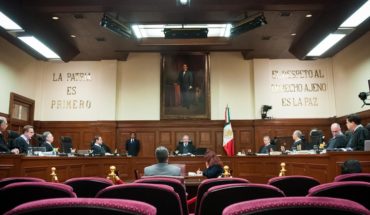The Attorney General’s Office (FGR) decided not to appeal the decision of federal judge Gregorio Salazar Hernández not to grant the 31 arrest warrants he had requested against academics denounced by Conacyt, however, it keeps the investigation open against him and could proceed again at any time.
On September 27, the three-working day period for the FGR to file the appeal expired without this happening. This means that the judge’s decision not to grant the orders requested on this occasion is final and final.
AUTHORITIES OF THE FGR confirmed to Political Animal that it was decided not to file the appeal, but clarified that this does not mean that the case is closed. On the contrary, the investigation by the Specialized Prosecutor’s Office on Organized Crime (FEDO) will continue to be integrated in order to, in due course, request arrest warrants again.
The appeal that the Prosecutor’s Office decided not to present would have sent the case without any change to the hands of a federal magistrate so that he could review it and decide if he ratified the refusal to grant the arrest warrants of Judge Salazar Hernández, or if he modified and granted them.
Read more | Judge responds to the FGR: the Conacyt case has no evidence or coherence; no crimes
However, in the face of criticism made by the judge who found problems both in substance and form in the summary of the accusation presented by the prosecutors, the Prosecutor’s Office chose to review the file and continue to perfect it to, in the end, make another attempt.
Judicial authorities explained that there is no deadline for the Public Prosecutor’s Office to decide whether or not to close the case, since it is its constitutional power to exercise criminal action when it considers it so. However, any application that is reso presented before this same judge or another will be reviewed as it already happened in the first attempts.
They plan to modify the list of crimes
In its first two attempts, the FGR asked the federal judge to order the arrest of the 31 academics for four crimes: organized crime, money laundering, illicit use of powers and embezzlement. In addition, he tried to have those involved detained in the high-security prison of the Altiplano, in Almoloya de Juárez, State of Mexico.
However, the judges found multiple flaws, from the lack of arguments with which it was intended to detain the scientists with arrest warrants (instead of voluntary summonses) to confine them in a prison of this type, to the absence of crimes to prosecute in the case.
In this context, and given the hypothesis that the FGR maintains that there was mismanagement for more than 200 million pesos, the investigation folder is being reviewed and important changes are planned with a view to proceeding again against the alleged involved.
In an interview granted to journalist Joaquín López Dóriga, the prosecutor specialized in Organized Crime, Alfredo Higuera Bernal, said that, although it is intended to request arrest warrants again, it is possible that it is attempted for crimes other than those initially required. It will also be assessed whether to apply against a smaller list of academics.
The purpose, explained the ministerial official, is to try to solve the accumulation of observations that the federal judge raised to deny the arrest warrants.
“Everything in the file is being reassessed, and taking into account the stipulations made by the judge in his decision, and rather, what results as a product of this analysis, and what determines where the institutional action is going to be directed,” said Prosecutor Higuera.
So far the Prosecutor’s Office has not clarified what crimes it would try to impute to the academics that it considers likely responsible, although in the statement that the FGR released last week it said that it was a case of “patrimonial crimes”. These crimes are those that are defined in the field of criminal law as those that affect the patrimony, and among them include, for example, thefts, frauds, various scams, among others.
However, for the moment the investigations of the case continue to be in charge of the Specialized in Organized Crime, which was previously known as the SEIDO.
Case against Álvarez-Buylla under follow-up
Regarding the investigation file that the FGR initiated against the current head of Conacyt, María Elena Álvarez-Buylla, for a complaint of contempt filed by federal judge Gabriel Regis López, federal authorities indicated that the case continues in integration, but so far a decision has not been takentermination.
According to what was reported by the media earlier this week, this is a case related to the allocation of resources to the so-called Scientific and Technological Consultative Forum A.C., in which several of the academics who were denounced by Conacyt itself worked.
Since last year, Judge Regis López had granted a suspension in favor of the so-called Scientific and Technological Consultative Forum A.C. – as part of an amparo trial – which forced Conacyt to continue providing resources to this civil association. However, the Álvarez-Buylla administration did not respond to that request.
In this context, the judge filed the criminal complaint in October last year, which led to the opening of the investigation. According to the authorities consulted, the Public Prosecutor’s Office is still collecting elements to determine whether or not there is a crime to prosecute.
The investigation of this specific case is in charge of the office of Deputy Attorney General Juan Ramos, considered the right hand of prosecutor Alejandro Gertz Manero.
What we do at Animal Político requires professional journalists, teamwork, dialogue with readers and something very important: independence. You can help us keep going. Be part of the team.
Subscribe to Animal Político, receive benefits and support free journalism.#YoSoyAnimal





